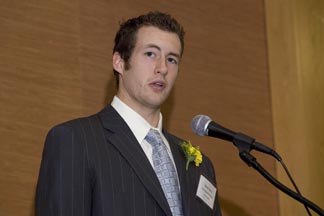'Don't ever give up on your kids,' Big Red goalie David McKee urges
By Linda Grace-Kobas

When the Big Red men's hockey team surges onto the ice, goaltender David McKee -- all 6-feet-1-inch and 185 pounds of him -- is a formidable presence. He inspires fear in his opponents and worship from the Lynah faithful.
"McKee quite possibly had the best season by a goaltender in the history of college hockey," wrote the Cornell Daily Sun about the 2004-05 season, in which McKee had 10 shutouts, an ECACHL single-season record. Amassing 15 shutouts in just two seasons, McKee broke Cornell hockey legend Ken Dryden's career record of 13. He was named Ivy League Player of the Year and first-team All-Ivy, as well as the ECAC Hockey League Goaltender of the Year and Player of the Year.
On the ice, McKee oozes confidence and power. Yet when the junior in the School of Hotel Administration related his academic and athletic path to an audience of more than 200 people at a fall celebration breakfast for United Way agency Franziska Racker Centers at the Clarion Inn Nov. 1, he confessed to being 10 times more nervous about speaking in public than facing "a bunch of guys shooting pucks 100 miles per hour at you."
McKee grew up in Irving, Texas, and learned how to skate by playing roller blade hockey with neighborhood kids. He got hooked on ice hockey after seeing his first Dallas Stars game. He had an inauspicious beginning, being the last kid chosen for a team. But he worked hard.
Though he improved in hockey, McKee struggled academically. He was, as he put it, "a kid with learning disabilities."
After kindergarten, McKee was tested and found to have mild dyslexia and possible attention-deficit disorder (ADD). He attended a school for dyslexic students through fourth grade. His parents home-schooled him for fifth through eighth grades, and then he went to the private Shelton School, where he had teachers, he said, "who understood that learning-difference students need acceptance, understanding, encouragement and to be given the benefit of the doubt when necessary."
With great support from teachers and his family, McKee had the confidence to apply to Cornell. In his freshman year, head coach Mike Schafer encouraged him to go to Cornell's Center for Learning and Teaching. McKee credits its Student Disabilities Services with helping him succeed academically.
"I have learned that I will always have to work harder and in different ways than average students to compensate for my learning differences," McKee said. "At times it has been easy for me to feel discouraged academically, but there always seems to be a coach, teacher or one of my parents to remind me that I am very capable and just need to stay focused on keeping the main things as my goals."
He made this plea: "... Don't ever give up on one of your kids. I think back to my first coach and am so grateful that although I was the last chosen and the worst player there, he didn't give up on me. ... He made it possible for me to play hockey first, and by using hockey I got to attend Cornell University. I am asking you today, don't give up on even your worst student. You can never tell where he will go."
"People who work with learning-difference (LD) students are on one of the great teams in America," McKee said. "Teamwork is necessary not only in hockey but in working with LD children ... the [Franziska Racker Centers] staff, donors and community partners must work together as a team to do your best each day to assure that your team gives the children the best chance each day."
The Franziska Racker Centers, which provides services to children and adults with special needs in Tompkins, Tioga and Cortland counties, is a United Way member agency in all three counties. Awards presented at the fall celebration included the Brick Miscall Award, which was given to the United Way of Tompkins County in recognition of the agency's dedication and support for people with special needs and its efforts to address fundamental problems in the community.
An early childhood evaluation program that helps families identify and obtain needed services for newborns to children 5 years old is among the services provided by Franziska Racker Centers that United Way helps to support, said Jody Scriber, director of clinical and educational services.
"United Way funds are used to help offset the deficit we have for developmental evaluations," Scriber explained. A full evaluation of a child's developmental needs takes about 10 hours to complete, she explained. State funding covers less than five hours.
McKee and the Franziska Racker Centers are "a great match," Scriber said. He and his parents have visited the Tompkins facility on Wilkins Road in the town of Ithaca. Scriber stressed the importance of McKee's message and involvement with children.
"There are all kinds of things you can do diagnostically, but if kids lose their sense of self, their sense that they can succeed, they will fail," she said.
McKee and his teammates have teamed up with Tompkins Trust Co. in a program called "Saves for the Centers." People can make a pledge in any amount for every save made by Big Red goalies this season. The goalies are expected to make around 900 saves. Tompkins Trust Co. has pledged $5 for every save, all to support services for children with special needs.
Richie Moran, former head lacrosse coach at Cornell and a past president of Franziska Racker Centers' board of directors, also spoke and praised McKee as an inspiration to young people. He said Cornell's learning disabilities program is "one of the best in the country."
Media Contact
Get Cornell news delivered right to your inbox.
Subscribe